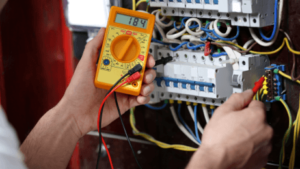An electrician specializes in electrical wiring of commercial buildings, electrical transmission lines, power stations, industrial machinery, and various related technical equipment. Electricians can also be employed to install new electrical equipment or repair and maintain existing electric infrastructure. In addition, many accredited electrician training centers provide courses to aspiring electricians. The courses these electrician training centers offer are designed to keep in view the practical requirements of an electrician in real-world situations.

It is tough to find an electrician; therefore, many electricians work on a contract basis. Electricians are required to know all aspects of electricity and its distribution. They must have excellent communication skills and interpersonal skills as well. These skills are vital in maintaining work ethics in a company environment.
There are many types of electricians available – Certified Electricians (CEC), Licensed Electricians (LWE), and Non-Certified Electricians (NCE). The role of electricians varies according to the type of system they serve. For instance, a LEW is an individual who holds a license but is not an electrician. A CEC has the necessary training, while an NCE is an individual who possesses both the activity and the permit to work as an electrician.
All electricians need to pass a comprehensive examination covering all aspects of electricity. All electricians must also pass a background check that is usually conducted by government agencies such as OSHA. In addition, all electricians are required to acquire a specialized license before starting work. This license proves that the electrician has completed all their classes and received a certification from an authorized body. The permit also indicates that the electrician has met all the stringent electrical work safety rules.
To begin with, an electrician uses three different kinds of tools to connect electricity: direct current (DC), alternating current (AC), and voltage. Next, an electrician connects DC electricity to electric panels that produce electricity. Finally, the electrician also connects AC electricity to the electrical panels and has voltage. Thus, the whole process involves four steps.
To get started in this industry, there are numerous ways to get an electrician job. Electrician jobs can be obtained from several sources, such as a nearby hardware store, electrical construction company, or electrical contracting service. In most cases, electricians get their start by working in an apprenticeship program. The scope of an apprenticeship program consists of two main components: On the one hand, apprentice electricians help the experienced electricians in their jobs. Secondly, the apprentice gets practical training on how to install and repair various kinds of electrical equipment. There are numerous advantages to getting into an apprenticeship program.
First, it is imperative to note that the length of an apprenticeship program, whether on-the-job or through an apprenticeship program, is critical to an electrician’s success. Generally, an apprenticeship must last for six months. This is because the electrician has been through practical training and has been given hands-on experience installing and repairing electrical equipment through this period. During this period, the electrician’s abilities and capabilities are enhanced considerably. Through this, the electrician’s knowledge is further improved, and they will be ready to take on more complex tasks, such as installing and repairing high-voltage equipment or high-power lights.
Furthermore, electricians learned the most important rules and safety measures related to electrical work during this period. This will then prepare them to undertake more significant electrical works and eventually save them a great deal of money, time, and stress. Electricians who have completed their apprenticeship can also call themselves professionally licensed electricians. To obtain a license, they will be required to complete at least 500 hours of continuing education successfully. They will also need to pass written and practical examinations. After completion of the coursework and the tests, the electrician will be able to apply for licensing.